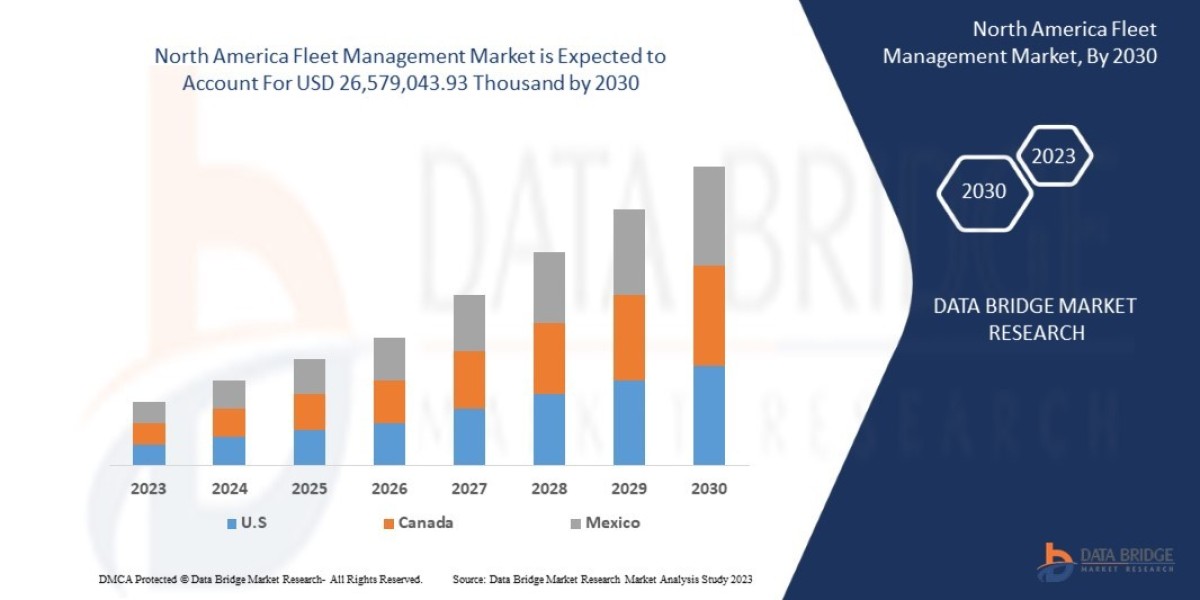Introduction
The North America fleet management market is emerging as a key enabler of efficiency, safety, and cost optimization for businesses operating in logistics, transportation, construction, energy, and public services. Fleet management solutions involve the use of telematics, software, and data analytics to oversee vehicle operations, monitor driver behavior, manage fuel consumption, and ensure regulatory compliance. With a growing dependence on road transport and logistics, fleet management is no longer optional—it is a critical element of competitiveness.
Globally, North America plays a pivotal role in shaping the fleet management sector due to its advanced digital infrastructure, widespread adoption of telematics, and strong presence of technology providers. The region’s booming e-commerce industry, increasing demand for real-time supply chain visibility, and stringent safety regulations have further fueled adoption across industries.
This report provides an in-depth analysis of the North America fleet management market, exploring its current landscape, major drivers, restraints, segmentation, competitive environment, and future growth prospects. It delivers insights designed for stakeholders, including fleet operators, technology providers, investors, and policymakers.
Source - https://www.databridgemarketresearch.com/reports/north-america-fleet-management-market
Market Overview
Fleet management refers to a broad set of technologies and services that allow businesses to coordinate and optimize vehicle operations, driver performance, and asset utilization. This market covers solutions such as GPS tracking, telematics systems, fleet analytics, fuel management, route planning, and compliance management. It also encompasses hardware devices like onboard sensors and software platforms for centralized monitoring.
Historically, fleet management in North America began with basic tracking solutions but has evolved significantly with the rise of digitalization and the Internet of Things (IoT). Companies increasingly rely on data-driven insights to enhance efficiency, improve driver safety, and reduce operational costs. The rapid expansion of e-commerce and last-mile delivery networks has made real-time monitoring and predictive analytics vital.
The current market is characterized by strong adoption among enterprises of all sizes, from small delivery firms to multinational logistics corporations. The integration of artificial intelligence, machine learning, and cloud computing into fleet management solutions is reshaping the competitive landscape. North America is considered one of the most advanced regions globally, with widespread penetration of telematics and advanced fleet tracking systems.
Market Drivers and Opportunities
Several forces are driving the growth of the North America fleet management market. The most prominent driver is the rise of e-commerce and the subsequent demand for faster, more efficient delivery networks. Companies are investing heavily in fleet optimization to meet customer expectations for real-time visibility, accurate delivery windows, and cost-effective operations.
Regulatory pressures also play a significant role. Federal mandates, such as the requirement for electronic logging devices (ELDs), have accelerated the adoption of digital fleet management systems to ensure compliance. Safety regulations are further encouraging fleet operators to adopt solutions that monitor driver behavior and reduce accidents.
Technological innovation presents vast opportunities. Advanced telematics, artificial intelligence, and predictive analytics are enabling smarter decision-making and proactive maintenance. Electrification of fleets and the rise of connected vehicles create new avenues for fleet management providers to develop solutions tailored for alternative fuel vehicles.
Investors and businesses also see opportunities in small and medium-sized enterprises (SMEs), many of which are beginning to adopt fleet management solutions as costs decline and cloud-based systems become more accessible. Additionally, government initiatives promoting green transportation and sustainability offer potential for fleet management solutions to support carbon reduction strategies.
Market Challenges and Restraints
Despite promising growth, the North America fleet management market faces challenges. One of the biggest hurdles is the high initial investment required for advanced fleet management systems. While large corporations may absorb these costs, smaller businesses often struggle with adoption due to budget constraints.
Data privacy and cybersecurity concerns present another barrier. With fleets increasingly connected through IoT devices and cloud platforms, vulnerabilities to hacking and data breaches remain significant risks.
The industry also grapples with integration issues. Many fleet operators use legacy systems, making it difficult to seamlessly incorporate advanced digital solutions. Resistance to change among drivers and operators further slows adoption.
Additionally, volatility in fuel prices and global supply chain disruptions can affect the return on investment for fleet management systems. While technology provides efficiency, external factors such as geopolitical tensions, inflation, or vehicle shortages may limit short-term growth.
Market Segmentation Analysis
The North America fleet management market can be segmented by solution type, end-user application, deployment model, and geography.
By solution type, the market includes telematics, fleet analytics, driver and vehicle tracking, fuel management, maintenance management, and compliance solutions. Telematics and GPS tracking remain the most widely adopted, while predictive analytics and AI-driven platforms represent the fastest-growing categories.
By end-user application, logistics and transportation companies lead adoption, driven by the need for real-time monitoring and delivery optimization. Other industries such as construction, utilities, oil and gas, and government services are also key consumers, leveraging fleet management to monitor heavy equipment and service vehicles.
By deployment model, cloud-based solutions are gaining momentum due to their scalability, lower upfront costs, and remote accessibility. On-premise systems remain relevant for larger enterprises with specific security or customization needs.
Regionally, the United States dominates the market, benefiting from advanced infrastructure, government regulations, and a strong base of technology providers. Canada follows closely, driven by investments in logistics, energy, and cross-border trade. Mexico is emerging as a promising market, particularly with the expansion of manufacturing and automotive industries.
Competitive Landscape
The North America fleet management market is highly competitive, featuring global technology giants, telematics specialists, and regional solution providers. Leading players operate across hardware, software, and services, offering integrated platforms that cover the full spectrum of fleet operations.
Major companies are expanding their portfolios through mergers, acquisitions, and partnerships. Collaborations between telematics providers and automotive manufacturers are increasingly common, aiming to embed fleet management capabilities directly into vehicles. Software vendors are also focusing on expanding cloud-based offerings to cater to SMEs and mid-sized businesses.
Innovation is central to competitive strategy. Companies are investing in artificial intelligence, real-time analytics, and IoT integration to deliver predictive maintenance, fuel optimization, and enhanced driver safety features. Sustainability initiatives, such as tools for monitoring carbon emissions and managing electric vehicle fleets, are also gaining attention.
Smaller and regional players remain competitive by offering niche solutions, customization, and strong customer support. This fragmented yet dynamic market ensures continuous innovation and competitive pricing.
Future Outlook and Trends
The North America fleet management market is expected to grow steadily over the next decade, supported by digital transformation, regulatory enforcement, and the continued expansion of logistics and transportation. The electrification of fleets will be a major trend, with businesses increasingly investing in solutions tailored for electric vehicle (EV) performance, charging infrastructure, and cost optimization.
Artificial intelligence and machine learning will drive predictive analytics, allowing fleet managers to anticipate maintenance needs, optimize routes, and reduce downtime. Integration with smart city infrastructure is also on the horizon, creating opportunities for connected fleets to interact with urban mobility systems.
Sustainability will remain a defining theme, as companies align fleet operations with corporate social responsibility (CSR) goals and government carbon reduction mandates. Solutions that provide emissions tracking and optimization for greener fleets will see rising demand.
Regionally, the United States will remain the largest and most technologically advanced market, while Canada and Mexico will experience accelerated adoption driven by logistics growth and cross-border trade. Over the long term, the North America fleet management market will evolve into a highly data-driven and sustainability-focused ecosystem.
Conclusion
The North America fleet management market is one of the most advanced and strategically important in the world, driven by innovation, regulatory pressures, and the expansion of e-commerce and logistics. While challenges such as cost barriers, integration issues, and cybersecurity risks persist, the opportunities far outweigh the obstacles.
For stakeholders—including technology providers, fleet operators, and investors—the market represents a critical opportunity to capitalize on trends such as electrification, AI-driven analytics, and sustainability. The future of fleet management in North America will be defined by smarter, greener, and more connected solutions that support efficiency, compliance, and long-term competitiveness.
Frequently Asked Questions
What is the current size of the North America fleet management market?
The market is experiencing steady growth, supported by high adoption rates of telematics and compliance solutions. While estimates vary by research source, North America remains one of the largest and most mature fleet management markets globally.
What are the key drivers influencing growth in this market?
Key drivers include the rise of e-commerce, strict safety and compliance regulations, advancements in telematics and AI, and the growing demand for real-time supply chain visibility.
Which regions dominate the North America fleet management market?
The United States leads in adoption due to advanced infrastructure and regulatory enforcement. Canada and Mexico are also important markets, with growth driven by logistics, energy, and cross-border trade.
Who are the major players in the industry?
The market features global technology leaders, telematics providers, and regional firms. These companies compete on innovation, integration, and customer support while frequently expanding through mergers and partnerships.
What are the latest trends shaping the future of this market?
Trends include fleet electrification, AI-driven predictive analytics, sustainability initiatives, and greater integration with smart city infrastructure and connected vehicles.
What challenges could slow down growth in this sector?
Challenges include high implementation costs, data security concerns, integration difficulties with legacy systems, and external risks like fuel price volatility and supply chain disruptions.
How can businesses benefit from investing in the North America fleet management market?
Businesses benefit by improving operational efficiency, reducing fuel and maintenance costs, ensuring compliance, and enhancing driver and vehicle safety. Early adoption also positions companies to lead in sustainability and innovation.
Browse More Reports:
Global Urticaria Market
Global UV Adhesive Market
Global Varicose Vein Treatment Market
Global Veneer Sheets Market
Global Windows and Doors Market
Europe Alcoholic Beverages Market
Asia-Pacific Alopecia Treatment (Hair Loss) Market
Middle East and Africa Alopecia Treatment (Hair Loss) Market
Thailand Business Process Outsourcing (BPO) Market
Europe Corrugated Board Packaging Market
Asia-Pacific Essential Oils Market
U.S. Fleet Management Market
North America Fleet Management Market
Middle East and Africa Helium-3 Market
Europe Hemodialysis and Peritoneal Dialysis Market
Europe Industrial Metrology Market
Middle East and Africa Industrial Metrology Market
Europe Insect Protein Market
Asia-Pacific Insect Protein Market
Middle East and Africa Insect Protein Market
About Data Bridge Market Research:
An absolute way to forecast what the future holds is to comprehend the trend today!
Data Bridge Market Research set forth itself as an unconventional and neoteric market research and consulting firm with an unparalleled level of resilience and integrated approaches. We are determined to unearth the best market opportunities and foster efficient information for your business to thrive in the market. Data Bridge endeavors to provide appropriate solutions to the complex business challenges and initiates an effortless decision-making process. Data Bridge is an aftermath of sheer wisdom and experience which was formulated and framed in the year 2015 in Pune.
Contact Us:
Data Bridge Market Research
US: +1 614 591 3140
UK: +44 845 154 9652
APAC : +653 1251 975
Email:- corporatesales@databridgemarketresearch.com








